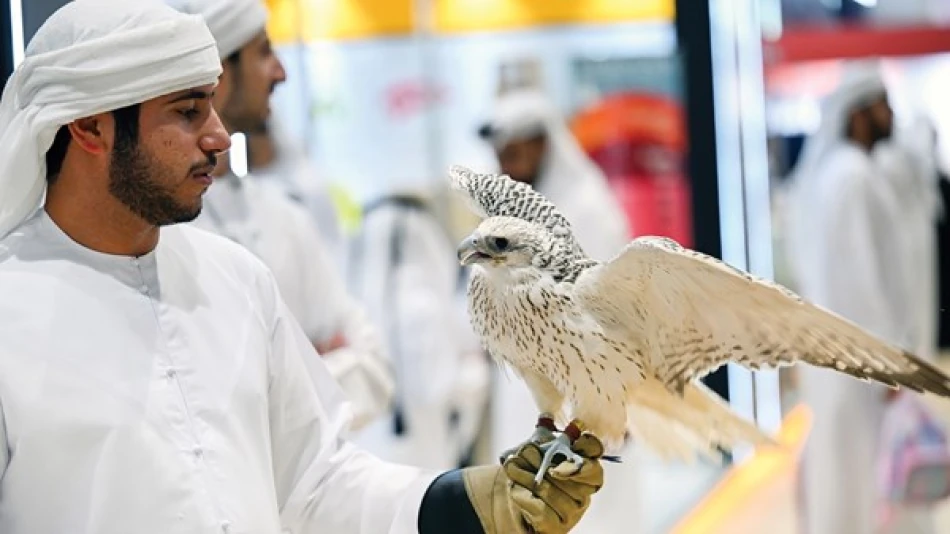
Abu Dhabi Hunting and Equestrian Club Celebrates National Identity and Preserves Heritage
Abu Dhabi's Hunting and Equestrian Exhibition Cements UAE's Position as Global Heritage Capital
The 22nd Abu Dhabi International Hunting and Equestrian Exhibition concluded with record-breaking attendance, demonstrating how the UAE continues to leverage cultural heritage as both economic driver and soft power tool. Beyond the traditional displays of falconry and Arabian horses, this year's event showcased cutting-edge innovations from AI-powered equine health monitoring to luxury gold-crafted traditional weapons, signaling the Emirates' strategic blend of authenticity and technological advancement in the global luxury tourism and heritage sectors.
Strategic Cultural Positioning Pays Dividends
The exhibition, held under the patronage of Sheikh Hamdan bin Zayed Al Nahyan, drew tens of thousands of visitors over its week-long run at the Abu Dhabi National Exhibition Centre. This isn't merely about preserving tradition—it's about monetizing cultural capital in an increasingly competitive regional tourism market.
The UAE faces growing competition from Saudi Arabia's Vision 2030 cultural initiatives and Qatar's World Cup legacy projects. By positioning Abu Dhabi as the "global capital of culture and heritage," the Emirates is carving out a distinct niche that leverages its Bedouin roots while attracting international investment and tourism.
Heritage as Economic Engine
The Qasr Al Hosn pavilion exemplified this strategy, displaying rare artifacts including special bird passports that highlight falcons' significance in Emirati national memory. Such exhibits serve dual purposes: educating visitors about local culture while reinforcing the UAE's historical legitimacy as a trading and cultural hub.
The inclusion of poetry by the late Sheikh Zayed bin Sultan Al Nahyan adds gravitas, connecting contemporary visitors to founding narratives that justify current leadership and development models.
Innovation Meets Tradition: The AI Revolution Hits Equestrian Sports
Perhaps the most significant development was the introduction of "Sawari," an AI-powered application developed by three young Emiratis that uses artificial intelligence to detect lameness in horses. This represents exactly the kind of high-value, technology-driven innovation the UAE seeks to cultivate.
Market Implications for Equestrian Industry
The global equestrian market, valued at approximately $300 billion annually, has been slow to adopt digital technologies. Sawari's video analysis system could revolutionize horse training and veterinary care, potentially creating a new export industry for the UAE.
For investors, this signals the UAE's commitment to moving beyond oil-dependent sectors into knowledge-based industries. The government's support for such innovations through high-profile cultural events demonstrates strategic thinking about economic diversification.
Luxury Manufacturing: The "Made in UAE" Premium Brand
The exhibition featured several companies promoting locally manufactured luxury goods, from 24-karat gold Arabian swords requiring four months of handcrafting to aluminum-based caravans designed for harsh Gulf conditions.
Import Substitution Strategy
Companies like Solid Innovation are manufacturing caravans entirely within the UAE using aluminum instead of fiberglass, specifically addressing local climate challenges. This represents smart import substitution—creating products better suited to regional conditions while building domestic manufacturing capacity.
The "Made in UAE" branding initiative showcased at the exhibition mirrors similar efforts in Singapore and South Korea, where government support helped transform local manufacturers into global premium brands.
Regional Competition and Market Positioning
The UAE's approach contrasts sharply with Saudi Arabia's mega-project strategy exemplified by NEOM and Qiddiya. While Saudi Arabia pursues futuristic city-building, the UAE focuses on cultural authenticity combined with technological sophistication—a potentially more sustainable model for attracting both tourism and investment.
The Falconry Advantage
Falconry, recognized by UNESCO as an Intangible Cultural Heritage, provides the UAE with unique positioning. Unlike manufactured attractions, this authentic cultural practice cannot be easily replicated by competitors, giving Abu Dhabi sustainable competitive advantage in luxury cultural tourism.
Economic Impact and Future Outlook
The exhibition's success reflects broader trends in the UAE's economic diversification. The combination of heritage tourism, luxury manufacturing, and technology innovation creates multiple revenue streams while building soft power influence.
For international businesses, the event demonstrates market opportunities in the Gulf's growing outdoor recreation and luxury goods sectors. The strong attendance figures suggest robust domestic purchasing power despite global economic uncertainties.
Investment Implications
The exhibition's emphasis on sustainability and smart technology—from solar-powered caravans to AI veterinary applications—aligns with global ESG investment trends. International investors seeking exposure to Middle Eastern growth markets should note the UAE's strategic positioning at the intersection of tradition and innovation.
As the curtain falls on another successful edition, the Abu Dhabi International Hunting and Equestrian Exhibition has proven its value as more than cultural celebration—it's a sophisticated economic development tool that positions the UAE as the region's premier destination for authentic luxury experiences backed by cutting-edge technology.
Most Viewed News

 Layla Al Mansoori
Layla Al Mansoori






